President of the Republic of Azerbaijan Ilham Aliyev and United Nations Secretary-General António Guterres welcomed heads of state and government, as well as leaders of delegations participating in the Summit.
A family photo was taken following the welcoming ceremony.
President Ilham Aliyev delivered a speech at the opening ceremony of the World Leaders Summit.
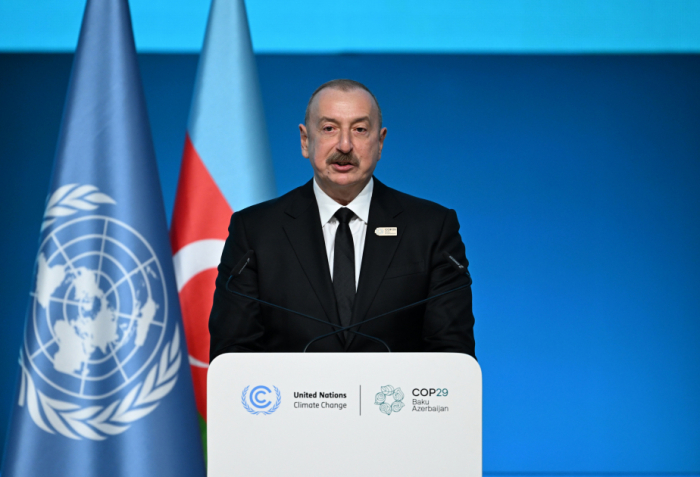
Speech by President Ilham Aliyev
- Distinguished Secretary-General of the United Nations,
Distinguished heads of state and government,
Ladies and gentlemen,
I welcome you all to Azerbaijan.
Many of our guests are visiting Azerbaijan for the first time. I hope they will have a chance to get acquainted with our country, its history, traditions, and culture.
I would like to thank the Secretary-General of the United Nations, Mr. António Guterres, and the Secretariat of the UNFCCC for their support of Azerbaijan on the path to COP29. I congratulate my dear brother, President of the UAE, His Highness Sheikh Mohamed bin Zayed Al Nahyan, and all his team on the landmark UAE consensus achieved at COP28 in Dubai, and their support in the preparation for COP29 in Baku.
Last December, by a unanimous decision of almost 200 countries, Azerbaijan was honored to host COP29. We consider this decision as a sign of respect for our country, as well as an appreciation of our active role on the international arena.
Azerbaijan is a country where East and West, North and South meet, and this is not only about geography. We can build political, cultural, energy, trade, and transportation bridges between different international actors. The mega projects initiated by Azerbaijan have already changed the energy and transportation maps of Eurasia and have led to the establishment of fruitful multinational cooperation formats.
Despite the 30-year-long occupation by Armenia of almost 20% of the internationally recognized territories of Azerbaijan, despite ethnic cleansing and the deportation of 1 million Azerbaijanis from their ancestral lands, we managed to build a strong country with a self-sufficient economy and independent policy. Four years ago, we celebrated the historical Victory in the Second Karabakh War.
A year ago, we fully restored our sovereignty in accordance with the UN Charter, international law, and UN Security Council resolutions, which had remained on paper for 30 years. We implemented these resolutions ourselves and restored international law, justice, and put an end to the Armenian occupation. As the President of COP29, Azerbaijan will do its best to find a common understanding between developed and developing countries, between the Global South and the Global North. For four years, by unanimous decision of 120 countries, Azerbaijan successfully chaired the Non-Aligned Movement, the second international institution after the United Nations.
Azerbaijan is also an active member of the Organization of Islamic Cooperation, which unites almost 60 countries. Azerbaijan has signed agreements and adopted declarations on strategic partnership with 10 members of the European Union. All this allows us to think that we may be very helpful and useful in building bridges between different important actors on the issue of climate change. Azerbaijan is an active supporter of multilateralism. At the same time, we play an active role in intercultural dialogue.
Together with the United Nations Alliance of Civilizations, every two years, we organize the Intercultural Dialogue Forum in Baku. Multiculturalism is our state policy and, at the same time, it is our lifestyle. The people of Azerbaijan, regardless of their ethnic or religious identity, live in peace and harmony as one family.
Now, I'd like to say a couple of words about Azerbaijan's green agenda. Our technical potential for renewable energy is estimated at 135 gigawatts onshore and 157 gigawatts offshore. Last year, Masdar from the UAE inaugurated the solar power plant of 230 megawatts, the biggest in our region. ACWA Power from Saudi Arabia is currently constructing a wind power station with a potential capacity of 240 megawatts.
During COP29, an agreement will be signed with bp from the UK to build a 240-megawatt solar power station in the district of Jabrayil, which was liberated from Armenian occupation four years ago. This project will provide decarbonization of one of the biggest oil and gas terminals in the world, the Sangachal terminal.
By 2030, we plan to build solar, wind, and hydro power stations of approximately six gigawatts. But this is not all of our plans. Contracts and MoUs for 10 gigawatts of renewable energy projects have been signed.
We are also looking at export markets and working actively with our partners in order to implement another important energy security project—the Black Sea Caspian energy cable.
This will allow us to export green energy to Europe, and the technical potential of this cable - by the way, feasibility studies will be ready very soon—is close to four gigawatts. But again, this is only the beginning. Our green agenda also covers different regions of Azerbaijan, so Nakhchivan, Karabakh, and East Zangazur regions of Azerbaijan have been declared green energy zones, and this is about the quarter of our territory.
Now, a couple of words I'd like to say about another segment of energy security, which is oil and gas. I understand that this topic is not very popular at a climate change conference, but without that, my comments would not be complete. Just to begin with information, the world's first industrial oil well was drilled in Azerbaijan, in Baku, in 1846. It is situated not far from this place. Maybe it may take a 10-15 minute drive. The first offshore oil well was also drilled by Azerbaijani oilmen in the Caspian Sea in the middle of 20th century. In the 19th century, Azerbaijan produced more than half of the world’s oil.
If, then, some Western politicians and media called us a petrostate, that would probably have been acceptable. But when they call us a petrostate now, today, this is not fair, and it only demonstrates a lack of political culture and knowledge. Today, Azerbaijan's share of global oil production is 0.7%, and its share of global gas production is 0.9%. But the fake news media of the country, which is the number one oil and gas producer in the world and produces 30 times more oil than Azerbaijan, calls us a petrostate.
They had better look at themselves, or at least at their neighbor, which produces 10 times more oil than Azerbaijan. Azerbaijan’s share in global gas emissions is only 0.1%. I have to bring these figures to the attention of our audience because right after Azerbaijan was elected as the host country of COP29, we became the target of a coordinated, well-orchestrated campaign of slander and blackmail.
Western fake news media, so-called independent NGOs, and some politicians seemed to be competing in spreading disinformation and false information about our country. To accuse us of having oil is the same as accusing us of having more than 250 sunny days a year in Baku.
Countries should be judged by other criteria. For instance, the level of unemployment in Azerbaijan, it is 5.4%, the level of poverty, it is 5.2%, our green agenda—I have already described our plans – how countries manage their foreign debt - in Azerbaijan, it's only 7.5% of GDP.
These, along with many other important criteria, should serve as the basis for evaluating the country's performance, rather than its natural resources, which are a gift from God. I said this several months ago, and now those who want to attack me, particularly the international media, simply quote me saying that this is a gift from God.
And I want to repeat it here today: it is a gift from God. Every natural resource, whether it's oil, gas, wind, sun, gold, silver, copper, they are all natural resources. Countries should not be blamed for having them, and should not be blamed for bringing these resources to the market because the market needs them. The people need them. So, this is my message. As the President of COP29, of course, we will be strong advocates for the green transition, and we're doing it, but at the same time, we must be realistic.
Another point of accusation is that two years ago, Azerbaijan and the European Commission signed a Declaration on strategic partnership in the field of energy. But it was not our idea. It was a proposal from the European Commission. The President of the European Commission came to Baku two years ago to sign this document with us. Because they needed our gas due to the change of geopolitical situation, and they asked us to help. And we said, “okay.” We are always ready to help if our help is needed. We said, “Okay, we will help Europe with the energy security.” When we signed this declaration two years ago, the number of countries, which were receiving our gas, I mean, European countries, was equal to two. So now, it's eight countries.
Eight out of ten countries, which have access to Azerbaijani gas are in Europe. The European Commission also asked us to double the gas supply to Europe by 2027, and this is reflected in the Declaration, which was signed by the President of European Commission and myself two years ago in Baku. Unfortunately, double standards, the habit of lecturing other countries, and political hypocrisy have become a kind of modus operandi for some politicians, state-controlled NGOs, and fake news media in some Western countries.
My last message is for those who, for almost one year, have been advocating for a boycott. They used all the tools in their possession to launch a campaign to boycott COP29 in Baku. I have bad news for them. We have 72,000 registered participants from 196 countries. Among them are 80 presidents, vice-presidents, and prime ministers. So, the world has gathered in Baku, and we say to the world: Welcome to Azerbaijan.
Thank you.
X X X
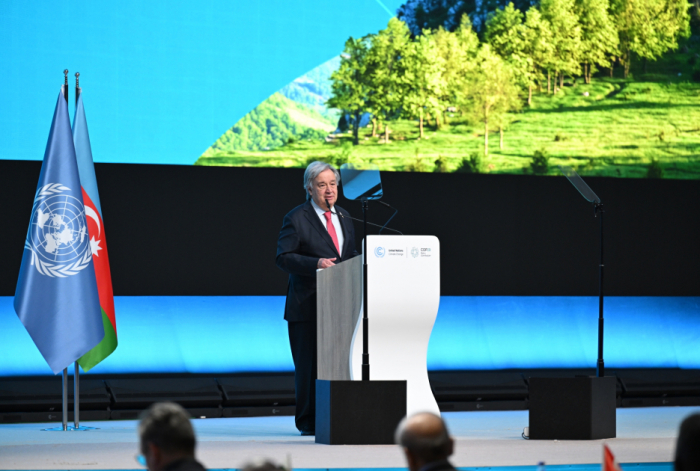
UN Secretary-General António Guterres, then, delivered his speech:
- President Ilham Aliyev, I thank you, the COP President, Mukhtar Babayev, and the government of Azerbaijan for your welcome and hospitality. The presidents can count on a full cooperation in your efforts to achieve the successful COP we all need.
The sound you hear is the ticking clock. We are in the final countdown to limit global temperature rise to 1.5 degrees Celsius. And time is not on our side.
Exhibit a: 2024. With the hottest day on record …and the hottest months on record …this is almost certain to be the hottest year on record. And a masterclass in climate destruction: Families running for their lives before the next hurricane strikes; Biodiversity destroyed in sweltering seas; Workers and pilgrims collapsing in insufferable heat; Floods tearing through communities, and tearing down infrastructure; Children going to bed hungry as droughts ravage crops.
All these disasters, and more, are being supercharged by human-made climate change. And no country is spared. In our global economy, supply chain shocks raise costs – everywhere. Decimated harvests push up food prices – everywhere. Destroyed homes increase insurance premiums – everywhere. This is a story of avoidable injustice.
The rich cause the problem, the poor pay the highest price. Oxfam finds the richest billionaires emit more carbon in an hour and a half than the average person does in a lifetime. Unless emissions plummet and adaptation soars, every economy will face far greater fury. But there is every reason to hope. At COP28, all of you agreed to move away from fossil fuels; To accelerate net zero energy systems, setting milestones to get there; To boost climate adaptation; And to align the next round of economy-wide national climate plans – or NDCs – with the 1.5 degree limit. It’s time to deliver. Humanity is behind you: a poll by the University of Oxford and the United Nations Development Programme finds that eighty percent of people around the world want more climate action. Scientists, activists, and young people are demanding change – they must be heard, not silenced. And the economic imperative is clearer and more compelling – with every renewables roll out, every innovation, and every price drop.
Last year – for the first time – the amount invested in grids and renewables overtook the amount spent on fossil fuels. Almost everywhere, solar and wind are the cheapest source of new electricity. Doubling down on fossil fuels is absurd. The clean energy revolution is here. No group, no business, and no government can stop it. But you can and must ensure it is fair, and fast enough to limit global temperature rise to 1.5 degrees Celsius. I urge you to focus on three priorities. First, emergency emissions reductions. To limit global temperature rise to 1.5 degrees Celsius, we must cut global emissions nine percent every year. By 2030, they must fall 43 percent on 2019 levels. Unfortunately, they are still growing at the present moment.
Now At this COP, you must agree to rules for fair, effective carbon markets that support that fight. Yesterday you made an important first step. You must build on it by agreeing rules for markets that respect the rights of local communities, and leave no space for land-grabbing. By next COP, you must deliver new economy-wide national climate action plans. You’ve agreed that your new plans will align with 1.5 degrees. That means they must cover all emissions and the whole economy; Advance global goals to triple renewables capacity, double energy efficiency, and halt deforestation by 2030; Slash global fossil fuel production and consumption thirty percent by the same date; And align national energy transition strategies and sustainable development priorities with climate action – to attract needed investment. All this must be achieved in line with the principle of common but differentiated responsibilities and respective capabilities, in the light of different national circumstances. All countries must do their part. And the G20 must lead. They are the largest emitters, with the greatest capacities and responsibilities. They must bring their technological know-how together – with developed countries supporting emerging economies. Every nation must have the tools and resources for climate action. And the United Nations will support that effort every step of the way. We’re supporting developing countries with new NDCs through the climate promise initiative; And striving for justice in the renewables revolution through our panel on critical energy transition minerals. But ultimately, only you can deliver, on national ambition and action. Only you can beat the clock on 1.5 degrees.
Second, you must do more to protect your people from the ravages of the climate crisis. The most vulnerable are being abandoned to climate extremes. The gap between adaptation needs and finance could reach up to $359 billion a year by 2030. These missing dollars are not abstractions on a balance sheet: they are lives taken, harvests lost, and development denied. Now more than ever finance promises must be kept. Developed countries must race the clock to double adaptation finance to at least $40 billion a year by 2025. Adaptation investments can transform economies, driving progress across the sustainable development goals. We need countries’ new climate action plans to set out adaptation financing needs. We need every person on earth to be protected by an alert system by 2027, in line with our early warnings for all initiative. And we need climate justice. Particularly, a surge in pledges to the new loss and damage funds. And commitments turning into cash – with finance pouring into the fund’s coffers. But we also need a fundamental step-change across the board.
And so, excellences, the third priority is finance. Developing countries eager to act are facing many obstacles: scant public finance; raging cost of capital; crushing climate disasters; and debt servicing that soaks up funds. The result: adaptation denied. And a tale of two transitions. Last year, developing and emerging markets outside China received just fifteen cents for every dollar invested in clean energy globally. COP29 must tear down the walls to climate finance. Developing countries must not leave Baku empty-handed. A deal is a must. And I am confident it will be reached.
We need a new finance goal that meets the moment. Five elements are critical to success. First, a significant increase in concessional public finance. Second, a clear indication of how public finance will mobilize the trillions of dollars developing countries need. Third, tapping innovative sources, particularly levies on shipping, aviation, and fossil fuel extraction, based on the principle that polluters must pay. Fourth, a framework for greater accessibility, transparency, and accountability – giving developing countries confidence that the money will materialize. Fifth, boosting lending capacity for bigger and bolder multilateral development banks. And I hope that some good news will come. This requires a major recapitalisation. And it requires reforms of their business models, including so that they can leverage far more private finance. The resources available may seem insufficient. But they can be multiplied with a meaningful change in how the multilateral system works. Big sums require big change. The COP29 outcome must build on the pact for the future – agreed by consensus in New York in September – and drive progress.
I urge the major MDB shareholders to use your position to push for change. There is no time to lose. On climate finance, the world must pay up, or humanity will pay the price. In this crucial period, you and your governments must be guided by a clear truth: Climate finance is not charity, it’s an investment. Climate action is not optional, it’s imperative. Both are indispensable: to a livable world for all humanity. And a prosperous future for every nation on earth. The clock is ticking. I count on you. Thank you.
x x x
Maimunah Mohd Sharif, Mayor of Kuala Lumpur, Malaysia, and Former Executive Director of the United Nations Human Settlements Programme (UN-Habitat), also addressed the summit.
x x x
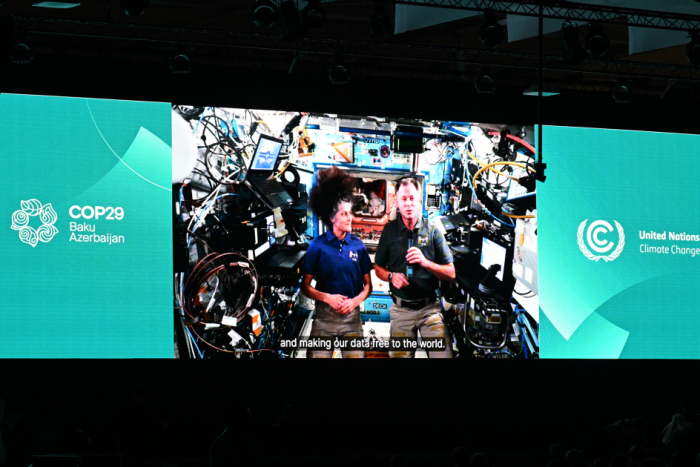
A special video message from NASA astronauts Sunita Williams and Nick Hague aboard the International Space Station was presented at the Summit.
x x x
This was followed by a cultural program.
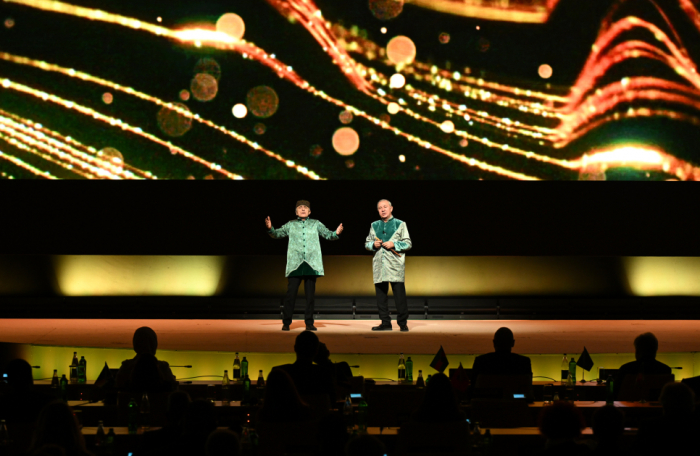
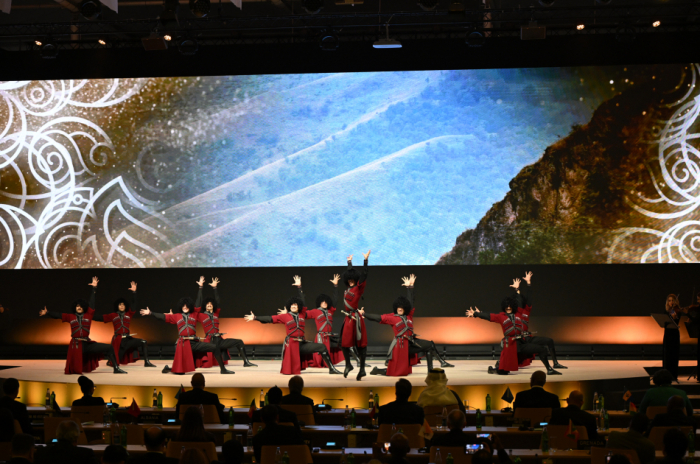
Photo
More about:








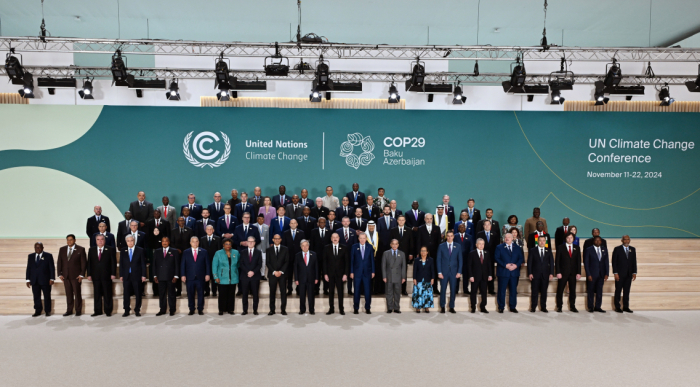
























































-1735029322.jpg&h=120&w=187&zc=1&q=70')







